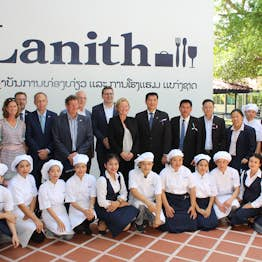Introduction
Diplomatic relations were established between Laos and Luxembourg in 1997, and thus Laos can be seen as a historic partner of Luxembourg’s Development Cooperation. The first Indicative Cooperation Programme (ICP) was signed in 2000 and the ICP is now in its fourth iteration (2016-2020). As a reliable development partner, Luxembourg’s Development Cooperation endeavours to contribute to poverty reduction and to strengthening institutions. Luxembourg supports Laos, which is among the least developed countries, in its transition to the category of middle-income countries and meeting the Sustainable Development Goals (SDGs).
Read more
The highlight of 2019 was the official visit by Minister Lenert to Laos from 6 to 14 September, accompanied by three members of the Luxembourg Chamber of Deputies and a Luxembourg press delegation. At the partnership committee meeting which was held at that time, the two countries’ authorities considered the recommendations made in the ICP IV mid-term review, which was completed at the start of 2019. The review confirmed the relevance of the four priority sectors supported by Luxembourg’s Development Cooperation in Laos, namely health; integrated local development; education and the development of vocational skills in tourism and hospitality; and inclusive governance and respect of the rule of law.
In 2019, a new strand of Luxembourg’s cooperation with Laos began, targeting the strengthening of management of official development assistance (ODA) in Laos. This project, implemented by LuxDev, seeks to build the capacities of the Laos authorities to enable better coordination of ODA and appropriate consideration of the Sustainable Development Goals (SDGs) in the interventions to support the national socio-economic development plan in Laos.
Five Luxembourgish NGOs were operating in Laos in 2019: Aide au Développement de la Santé (ADS), CARE Luxembourg, Handicap International Luxembourg and Fondation Caritas Luxembourg. Their sectors of operation were focused on the following areas: health and medical services, rural development, education and vocational training, clearance of land-mines and explosive remnants of war, and food and nutritional security. In addition to its continuing support for the Laos Microfinance Association (MFA), the Luxembourg association ‘Appui au développement autonome’ (ADA) has also continued its technical assistance for the transformation of village banks into formal microfinance institutions (MFIs), in synergy with the bilateral rural development programme financed by Luxembourg’s Development Cooperation within the framework of the ICP IV.
Priority areas of intervention
- Good health and well-being
- Quality education
- Reduced inequalities
- Peace, justice and strong institutions
Development of PDA
Reference data
- Population: 7,169,455
- GNI (per resident): USD 2,570
- Human Development Index (HDI): 140/189
- Life expectancy: 68
- Indicative Cooperation Programme: 2016-2020
Key achievements 2019
- Women account for 53% of the Central American migrant population, and social and physical violence are major risks during the migration process. Through Luxembourg’s support for the IMO’s regional programme hundreds of migrant women have had access to psycho-social and economic support since the start of this year.
- In order to protect the environment in Central America, Luxembourg is continuing its regional commitment to the Forestry and Climate Change Fund by supporting local communities and re-establishing forest areas that have been degraded as a result of climate change.
